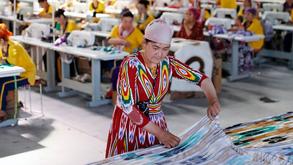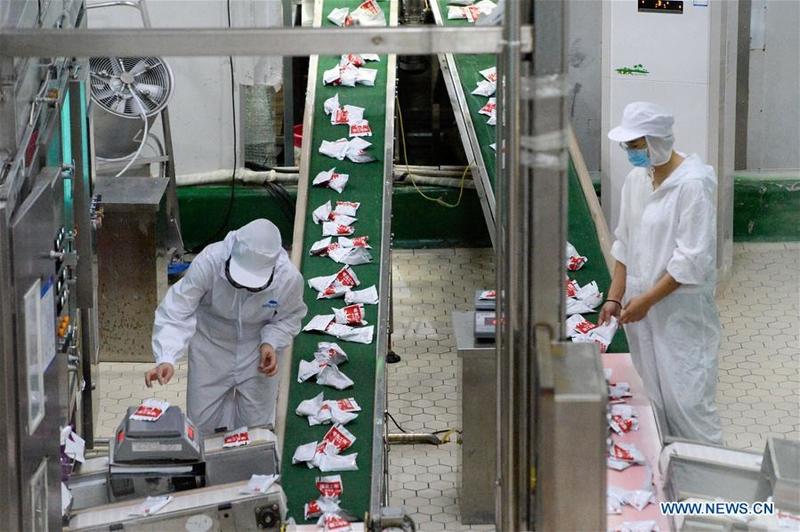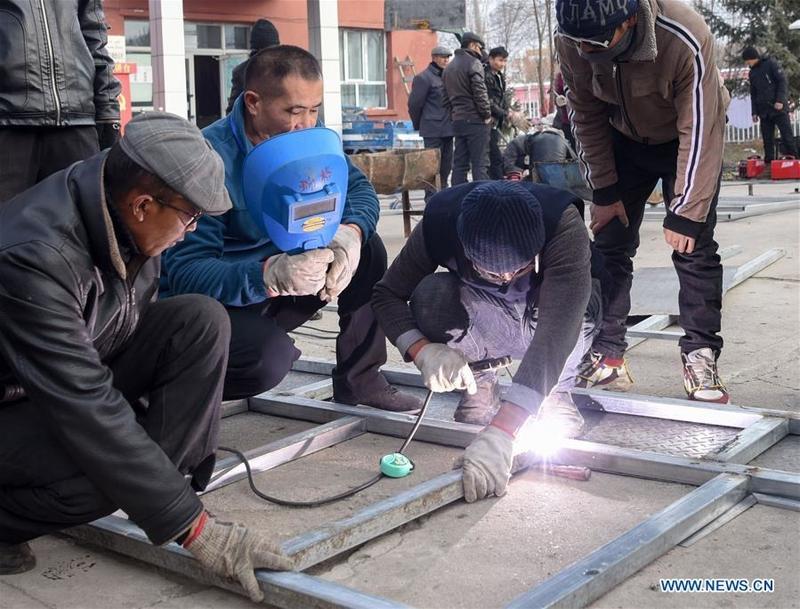 This undated photo shows seamstresses working at a sewing factory in the Xinjiang Uygur autonomous region. (PHOTO / XINHUA)
This undated photo shows seamstresses working at a sewing factory in the Xinjiang Uygur autonomous region. (PHOTO / XINHUA)
BEIJING - China's Xinjiang Uygur autonomous region fully respects workers' job preferences, according to a white paper released Thursday by the State Council Information Office.
Xinjiang takes the facilitation of employment as the most fundamental project for ensuring and improving people's wellbeing, according to the white paper titled "Employment and Labor Rights in Xinjiang".
According to the white paper, workers' job preferences have always served as an important reference for the local government of Xinjiang in designing its employment policies, expanding employment channels, creating jobs, organizing vocational training sessions, and providing placement services.
Xinjiang takes the facilitation of employment as the most fundamental project for ensuring and improving people's wellbeing, according to a white paper released by the State Council Information Office.
The region has taken a variety of measures to ensure that workers' job preferences are guaranteed. It has formed a comprehensive picture of the local labor resources, and kept track of the job preferences and needs of workers in a timely manner, according to the white paper.
The government has also actively built employment information platforms and continuously bolstered public employment services, while resolutely preventing and punishing any incidents of forced labor.
ALSO READ: Report on Xinjiang 'forced labor' criticized as fabricated
Through its proactive labor and employment policies, Xinjiang has continuously improved the people's material and cultural lives, and guaranteed and developed their human rights in every field, according to the document
There are six chapters in the white paper: employment in Xinjiang, proactive employment policies, full respect for workers' job preferences, labor rights protection, better jobs for better lives, and application of international labor and human rights standards.
Boosting employment
Xinjiang has achieved significant progress in increasing employment and ensuring public wellbeing while implementing COVID-19 control on a regular basis, according to the white paper.
READ MORE: Xinjiang resuming normalcy after virus outbreak
Xinjiang's registered urban unemployment rate has remained below 3.5 percent in recent years, according to the white paper.
The local government has taken multiple measures to alleviate economic difficulties and stabilize and boost employment, according to the document.
It has built a well-defined, five-tiered public employment service system for employers and employees. It has also expanded its services in areas such as policy advice, employment and unemployment registration, career guidance and recommendation, and skills and business startup training.
Meanwhile, the region has adopted policies offering periodical and targeted cuts in taxes and other employer contributions, aiming to facilitate the resumption of production and business activities as well as to increase employment generated by investment and industries, according to the document.
 Staff members work at the production line of Xinjiang Terun Dairy Company in Urumqi, northwest China's Xinjiang Uygur autonomous region, May 26, 2020. (DING LEI / XINHUA)
Staff members work at the production line of Xinjiang Terun Dairy Company in Urumqi, northwest China's Xinjiang Uygur autonomous region, May 26, 2020. (DING LEI / XINHUA)
Equal rights
Xinjiang has formulated and implemented a series of autonomous regional regulations based on local conditions, providing a solid legal guarantee for citizens to enjoy equal rights to work, according to the white paper.
The region ensures that there is no discrimination against workers on the basis of ethnicity, region, gender, and religious belief, and that no individuals' rights are restricted because of their urban or rural status, profession or position, according to the white paper.
Xinjiang has formulated and implemented a series of autonomous regional regulations based on local conditions, providing a solid legal guarantee for citizens to enjoy equal rights to work, according to the white paper
The region has fully implemented the national plan to ensure that everyone has access to social security and all those in need are covered, according to the white paper.
In ensuring women's rights, Xinjiang strives to remove barriers to employment and formulates policies to support women in starting their own businesses.
To protect the labor rights of persons with disabilities, Xinjiang puts in more efforts on their vocational training, promotes their employment at public welfare enterprises and institutions, offers them flexible and less demanding jobs and public service positions, and advances their proportional employment.
International standards practiced
Xinjiang has become a successful example of practicing international labor and human rights standards in underdeveloped areas with large populations of ethnic minorities, according to the white paper.
The region's policies and practices concerning employment and job security comply with China's Constitution and relevant laws, conform to international labor and human rights standards, and support the will of all ethnic groups to live a better life, according to the document.
Vocational training
To improve employability, Xinjiang has developed a complete system of vocational education and training, aiming to raise the basic quality of trainees and organize training oriented to specific demands, jobs and employers, according to the white paper.
Through vocational training, Xinjiang has built a large knowledge-based, skilled and innovative workforce that meets the requirements of the new era.
Every year from 2014 to 2019, Xinjiang provided training sessions to an average of 1.29 million urban and rural workers, of which 451,400 were in southern Xinjiang.
READ MORE: Xinjiang centers helping to improve lives
Meanwhile, enrollments in various kinds of education in Xinjiang have all reached the highest level in history, according to the white paper.
In 2019, there were 453,800 full-time students studying at universities and colleges in Xinjiang, an increase of 146,200 over 2014, and 1.84 million students studying at secondary schools, an increase of 147,600 over 2014, according to the white paper.
 A student practices welding during a vocational training class in Zhaosu county, northwest China's Xinjiang Uygur autonomous region, Dec 14, 2019. (DING LEI / XINHUA)
A student practices welding during a vocational training class in Zhaosu county, northwest China's Xinjiang Uygur autonomous region, Dec 14, 2019. (DING LEI / XINHUA)
Higher income
The income of residents and workers in Xinjiang has increased steadily from 2014 to 2019, according to the white paper.
The per capita disposable income of urban residents in Xinjiang increased from 23,200 yuan (US$3,314) in 2014 to 34,700 yuan in 2019, with an average annual nominal growth of 8.6 percent, while that of rural residents rose from 8,724 yuan to 13,100 yuan, with an average annual nominal growth of 8.9 percent, according to the white paper.
Eliminating poverty
Xinjiang has worked out new approaches to address some of the global challenges, such as protecting human rights while combating terrorism and extremism, and pursuing sustainable development while eliminating poverty, according to the white paper.
Xinjiang effectively prevents and strikes out at terrorism and extremism, and at the same time maintains social stability and improves people's lives, with its impoverished population and poverty incidence markedly reduced, according to the white paper.
Xinjiang will completely eliminate poverty by the end of 2020, according to the white paper.
From 2018 to 2019, 155,000 people from registered poor households in southern Xinjiang and in four impoverished regimental farms of the Xinjiang Production and Construction Corps found employment outside their hometowns and subsequently emerged from poverty.
From 2013 to the end of 2019, Xinjiang wiped out poverty in 25 poor counties and 3,107 poor villages, and the poverty incidence dropped from 19.4 percent to 1.24 percent. From 2014 to the end of 2019, a total of 2.92 million people from 737,600 households shook off poverty. By the end of 2020, poverty will be completely eliminated in Xinjiang, according to the document.


